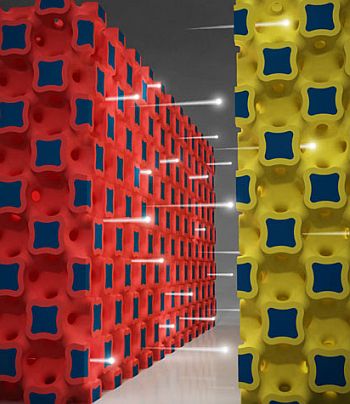Rethinking Inside The Box Brings ‘Super Battery’ Breakthrough


Researchers are claiming a breakthrough which promises to increase substantially the power of batteries, or at least dramatically reduce their physical size. Scientists at the University of Illinois revealed the breakthrough in the journal Nature Communications.
They claim to have developed a new lithium-ion battery microarchitecture, which can concurrently optimise ion and electron transport for high-power delivery.
Power of 3D
This new micro-architecture theoretically could allow the manufacturer to build a battery of a similar size to the current generation of lithium ion batteries found in today’s smartphones, but with thirty times the power. This architecture could be tweaked to allow for much smaller batteries to be designed and built to power a range of more-compact tech gadgets. Researchers claim their technology could reduce the size of batteries ten-fold while offering the same power.
The team in Illinois have used “3D-electrodes” which allow these new super batteries to be recharged 1,000 times faster than the current generation of batteries.
When a device such a smartphone or tablet is connected to a battery, an electrochemical reaction occurs to produce energy. The battery itself has three parts, an anode, cathode and the electrolyte in which they are immersed. The team has reduced the size of the anode and cathode and their three-dimensional designs offer a greater surface are in contact with the electrolyte.
This first appeared on TechWeekEurope UK. Read the whole story here.
Recent Posts
Flashpoint enters new chapter with global partner programme
Security vendor Flashpoint debuts partner programme following $28m funding
Channel partner “disconnect” hindering growth
Complex buying journeys and sprawling partner networks hampering customer experience, says Accenture
Cyxtera launches global channel partner programme
Datacentre provider Cyxtera says launch is “milestone in our go-to-market strategy”
US IT provider brings mainframe services to UK
Ensono highlights importance of mainframes still to major industries
VASCO and Nuvias expand distribution across EMEA
Security vendor VASCO looks to replicate UK and German set up across EMEA
Splunk says channel investments driving growth
Splunk details investment in Partner+ programme at .conf2017

View Comments
What a delight to see no split infinitives in a piece of writing, but what happened to the alternative in.....
"allow the manufacturer EITHER to build a battery of a similar size to the current generation of lithium ion batteries" OR.....what?
Thanks for your kind words and your eagle-eyed discovery of our oversight (which has now been corrected). Since Star Trek boldly went where no British scholar of grammar went before, split infinitives arguably have (sorry) become more acceptable - certainly more common. Sometimes the avoidance of split infinitives can change the meaning of what is being said. Consider:
You really have to watch him
You have to really watch him